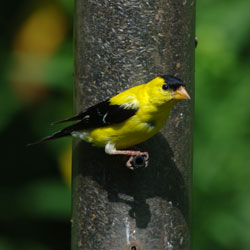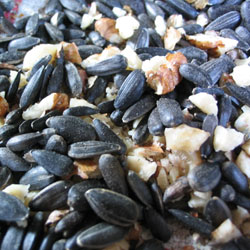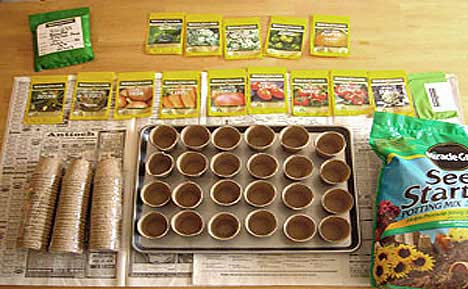Gardening and landscaping may be at a standstill during the coldest, deepest days of winter, but that doesn’t mean there is nothing to enjoy in your yard. In fact, there are many beautiful birds that visit our yards only in winter, including whole flocks of fantastic winter finches. With the right bird feeders and the very best birdseed, plus a few other key winter garden accessories, you can easily enjoy a flock of feathered fun all winter long.
Winter Finches to Watch For
There are many different birds that thrive in northern regions. When winter conditions are exceptionally harsh or food supplies are exceptionally low, these birds may move much further south than expected during the coldest months. While weather patterns, food sources and population changes all impact how many of these birds visit feeders, some of the most eagerly anticipated winter finches include…
- Common redpolls
- Evening grosbeaks
- Pine siskins
- Purple finches
- Red crossbills
Several other northern species, including snow buntings, bohemian waxwings and boreal chickadees may also be seen at feeders more frequently in winter, but it is the finches that are often the most welcome and reliable winter guests – if you have the right birdseed and feeders to attract them.
Not in a northern area? No need to miss out even if the typical winter finches won’t make it to your yard! Many other finches, including house finches, Cassin’s finches, American goldfinches and lesser goldfinches visit more southerly regions in the winter or even stay in the same range year-round, and these tips work just as well for those species.
Feeding Winter Finches
Winter finches eat mostly seeds and grain, and they require great quantities of nutritious food to keep up their body heat and energy in the bitter cold. Black oil sunflower seed is ideal for most winter finches, even in southern areas. While their sturdy bills can break open these seeds, hulled sunflower seed is often preferred because there will be no discarded shells to build up under the feeder until the ground can be cleaned in the spring. Offering this seed in open platform feeders will accommodate large, hungry flocks, but hopper or tube feeders with covers will protect the seed better from snow, ice and winter rains that can cause mold.
The smaller finches, siskins, redpolls and goldfinches, are especially fond of Nyjer (finch) seed, and it is best to offer these tiny, lightweight seeds in small tube feeders or mesh feeders.
Making Your Yard More Finch-Friendly
The right food and feeders will feed hungry winter finches, but there are several additional accessories you can add to your yard to make it even more finch-friendly.
- Fresh Water
Despite all the snow and ice around in winter, birds need liquid water even more than they need food. Providing a heated bird bath when temperatures drop will give birds a fresh, liquid water source to visit so they don’t need to waste precious calories melting their own water. - Safe Shelter
These birds are used to cold, but extra shelter can make a critical difference in bitter cold snaps, especially further south where dropping temperatures aren’t as common. Bird roost boxes and bird houses can be left up year-round for fast, easy shelter, and dense evergreen plantings also provide a good windbreak and comfortable spot for birds to rest. - Clean Facilities
Bacteria is easily spread through dirty water and bird feces, and clean baths and feeders are essential to keep finches and other backyard birds safe. Use a weak bleach solution to sterilize feeders and baths regularly, and use scrub brushes, old toothbrushes or bottle brushes to get into every nook and cranny. Some bird diseases can also affect humans, so be sure to wear gloves when cleaning. - Open Feeding Areas
Even the best food and greatest feeders won’t be useful if the feeding areas are buried under ice and snow. A broad, umbrella-style baffle can keep snow off feeders, or you can use a brush or old broom to gently remove snow when needed. Keep a small ground feeding area shoveled or tamped down to make foraging easier for birds under the feeder as well.
Winter finches are amazing backyard visitors that aren’t deterred by the cold days, chilly winds and frozen ground that keep gardeners inside for months. By providing good quality food, suitable feeders and other finch-friendly accessories, you can enjoy the energy, color and excitement of these birds in your yard all winter long.







